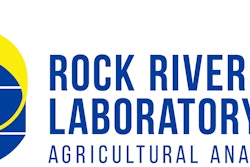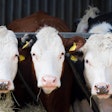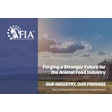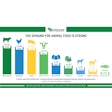
On Tuesday, David Edwards, Ph.D., director of the Division of Animal Feeds, U.S. Food and Drug Administration, Center for Veterinary Medicine, discussed several aspects of FSMA and updated attendees during the 2021 Pet Food Conference.
Edwards noted that the FDA has hired several CVM reviewers that represent various scientific disciplines over the last few months. These new hires are training now for inspections.
He also noted that with the last year, FSMA inspections were limited as the FDA was working to keep personnel safe during the COVID-19 pandemic.
While limited, he did note that inspectors were still encountering firms that didn’t have written food safety plans, or the plans were missing pieces, including evaluations of hazards. The last note Edwards made was that some facility plans did not identify preventive control measures.
“These missing pieces are concerning,” says Edwards. “Each step builds on a prior step to ensure safety. If you don’t have a solid foundation or if all steps aren’t evaluated, missteps can happen. Then a facility may be facing a recall or an event that could have been prevented.”
Edwards noted that in September and December 2020, the FDA had recalls due to high levels of aflatoxin in pet food. He said this highlights the need for prerequisite programs being in place.
Prerequisite programs are used to reduce the probability of mycotoxins and ensure medicated feeds are handled properly.
“Your prerequisite programs need to be robust and consistent,” Edwards says. “Failure to do so, may cause recalls and compliance situations.
“And remember, you can have the perfect plan, but it must be followed,” he continues. “Ensure your program is designed to be consistent and that employees are following it.”
Comprehensive Animal Food Compliance Program
The FDA is getting ready to implement its Comprehensive Animal Food Compliance Program which is designed to improve the inspection process. Instructions to FDA field staff, including planning/priorities, inspectional approach and interactions, will be improved to ensure consistency.
“The FDA is now trying to move toward a comprehensive approach based on lessons learned during the pilot program time,” says Edwards. “This program helps provide a more complete picture of a facility and ensures only one visit per year to a facility.”
The comprehensive approach, with a focus on relationships and communications, will bring about consistent outcomes for inspections, says Edwards.
Upcoming FSMA implementation
Edwards noted the following rulemaking/guidances with regards to FSMA:
- Food traceability – proposed rule does not include animal food
- Customer provisions – next expected proposed rule
- Future ongoing rulemaking, including farm definition, human food by-products
- Finalize preventive controls guidance (GFI #245)
Implementation
- Finalize Comprehensive Animal Food Compliance Program
- Rank animal food facility inventory by risk
Dr. Dave Edwards is the Director of the Division of Animal Feeds at the Food and Drug Administration’s Center for Veterinary Medicine (CVM). The Division regulates animal food, including premarket ingredient approvals, medicated feed and post-market feed safety monitoring. He joined the office as the Deputy Director in 2014. Prior to joining the CVM, Dr. Edwards served as the Director of animal biotechnology at the Biotechnology Innovation Organization (BIO) in Washington, D.C.
BIO is the world’s largest biotechnology trade association. He has also worked on the majority professional staff of the U.S. Senate Committee on Agriculture, Nutrition and Forestry and as a congressional science fellow with the Federation of Animal Science Societies on the same committee. Dr. Edwards grew up in Iowa and raised pigs, sheep and specialty crops. He received his bachelor’s in genetics and agricultural biochemistry from Iowa State University and his master’s and Ph.D. in animal science breeding and genetics at Michigan State University. He is also a graduate of the U.S. Federal Executive Institute.


















